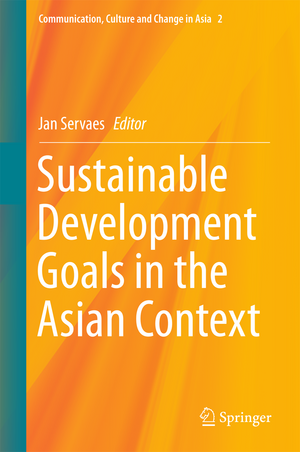Sustainable Development Goals in the Asian Context: Communication, Culture and Change in Asia, cartea 2
Editat de Jan Servaesen Limba Engleză Hardback – 15 noi 2016
This book presents research that focuses on Sustainable Development in Asia. Chapters are extended works of papers presented at Communication/Culture and The Sustainable Development Goals (CCSDG): Challenges for a New Generation, an international conference held in Chiang Mai University in December 2015. The chapters address assessments of Millennium Development Goals in several Asian countries and the region as a whole. The book also identifies and discusses the changes and potential improvements in the transition from Millennium Development Goals (2000-2015) to Sustainable Development Goals (2015-2030). Areas that are covered in the book, which are illustrated with case studies, include Corporate Social Accountability, Information and Communications Technologies, and Small Medium Enterprises (SMEs). The book serves as a useful resource for academics, scholars, students, and policymakers, interested in Development Studies.
| Toate formatele și edițiile | Preț | Express |
|---|---|---|
| Paperback (1) | 575.22 lei 39-44 zile | |
| Springer Nature Singapore – 29 iun 2018 | 575.22 lei 39-44 zile | |
| Hardback (1) | 699.28 lei 6-8 săpt. | |
| Springer Nature Singapore – 15 noi 2016 | 699.28 lei 6-8 săpt. |
Preț: 699.28 lei
Preț vechi: 822.68 lei
-15% Nou
Puncte Express: 1049
Preț estimativ în valută:
133.81€ • 145.93$ • 112.83£
133.81€ • 145.93$ • 112.83£
Carte tipărită la comandă
Livrare economică 24 aprilie-08 mai
Preluare comenzi: 021 569.72.76
Specificații
ISBN-13: 9789811028144
ISBN-10: 9811028141
Pagini: 198
Ilustrații: XXIV, 174 p. 19 illus.
Dimensiuni: 155 x 235 x 13 mm
Greutate: 0.49 kg
Ediția:1st ed. 2017
Editura: Springer Nature Singapore
Colecția Springer
Seria Communication, Culture and Change in Asia
Locul publicării:Singapore, Singapore
ISBN-10: 9811028141
Pagini: 198
Ilustrații: XXIV, 174 p. 19 illus.
Dimensiuni: 155 x 235 x 13 mm
Greutate: 0.49 kg
Ediția:1st ed. 2017
Editura: Springer Nature Singapore
Colecția Springer
Seria Communication, Culture and Change in Asia
Locul publicării:Singapore, Singapore
Cuprins
Chapter 1. Strategies for commons transition and sustainable development.- Chapter 2. Changing cultures, changing landscapes: shifting material use & consumption patterns and its impacts to the culture-environment nexus of sagada, northern Philippines.- Chapter 3. Companies’ accountability in sustainability: a comparative analysis of SDGS in five countries.- Chapter 4. A structural reform only can empower sustainable development and eradicate poverty.- Chapter 5. A synthesis of the studies on information communication technologies (ict) for education projects in ASEAN: can we close the digital divide?.- Chapter 6. Sustainable organizing: discourse of an eco-university.- Chapter 7. The transition from MDGS to SDGS: buzzwords and narratives.- Chapter 8. Development communication and the social integration of the new services and techniques: acceptance, appropriation and the role of the perceived value of use. multi-site case study within the sme support in central asia.
Notă biografică
Jan Servaes (PhD) is UNESCO Chair in Communication for Sustainable Social Change. He has taught International Communication and Communication for Social Change in Australia, Belgium, China, Hong Kong, the United States, The Netherlands, and Thailand, in addition to several teaching stints at about 120 universities in 55 countries.
Servaes is Editor-in-Chief of the Elsevier journal “Telematics and Informatics: An Interdisciplinary Journal on the Social Impacts of New Technologies”, and Editor of the Lexington Book Series “Communication, Globalization and Cultural Identity”, and the Springer Book Series “Communication, Culture and Change in Asia”.
Servaes has undertaken research, development, and advisory work around the world and is the author of journal articles and books on such topics as international and development communication; ICT and media policies; intercultural communication; participation and social change; and human rights and conflict management. He is known for his ‘multiplicity paradigm’ in “Communication for Development. One World, Multiple Cultures” (1999).
Servaes is Editor-in-Chief of the Elsevier journal “Telematics and Informatics: An Interdisciplinary Journal on the Social Impacts of New Technologies”, and Editor of the Lexington Book Series “Communication, Globalization and Cultural Identity”, and the Springer Book Series “Communication, Culture and Change in Asia”.
Servaes has undertaken research, development, and advisory work around the world and is the author of journal articles and books on such topics as international and development communication; ICT and media policies; intercultural communication; participation and social change; and human rights and conflict management. He is known for his ‘multiplicity paradigm’ in “Communication for Development. One World, Multiple Cultures” (1999).
Textul de pe ultima copertă
This book presents research that focuses on Sustainable Development in Asia. Chapters are extended works of papers presented at Communication/Culture and The Sustainable Development Goals (CCSDG): Challenges for a New Generation, an international conference held in Chiang Mai University in December 2015. The chapters address assessments of Millennium Development Goals in several Asian countries and the region as a whole. The book also identifies and discusses the changes and potential improvements in the transition from Millennium Development Goals (2000-2015) to Sustainable Development Goals (2015-2030). Areas that are covered in the book, which are illustrated with case studies, include Corporate Social Accountability, Information and Communications Technologies, and Small Medium Enterprises (SMEs). The book serves as a useful resource for academics, scholars, students, and policymakers, interested in Development Studies.
Caracteristici
Appeals to moral and ethical values, while highlighting technology assessments via economic or political models Focuses on the role and place of communication and culture Adds value to themes, which are normally monopolized by economics, engineers and politicians Includes supplementary material: sn.pub/extras








